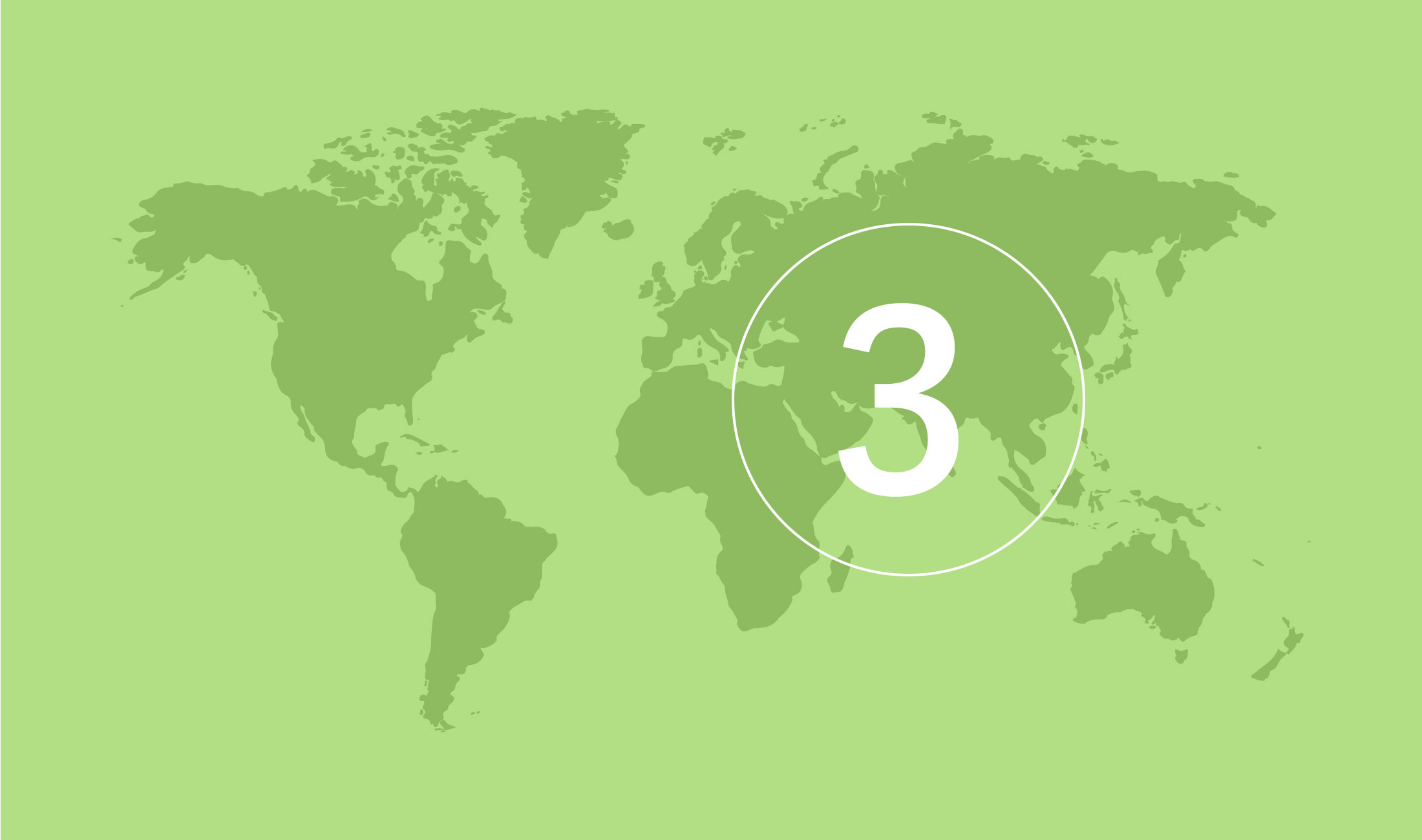
Mexico
Category
3 of 7
| Risk type | Short | Long |
|---|---|---|
| Sovereign | ||
| Public | ||
| Bank | ||
| Corporate |
The icons indicate EKN's risk assessment.
A lower country risk category means a lower country risk. The icons mark EKN's ability to cover risks to different buyers in the country.
-
No policy established
- EKN has not analysed this country recently and therefore has no current opinion. If an exporter submits an application for such a country, EKN performs an analysis of the country at short notice and determines a policy.
-
Normal risk assessment
- EKN decides on guarantee issue based on an assessment of risk in the transaction. There are no predefined restrictions in the risk assessment or assumptions for risk assessment.
-
Restrictive risk assessment
- EKN sets stricter requirements in the risk assessment in order to guarantee a transaction. EKN may have specified special criteria that are key to the risk assessment of the guarantee holder category in question. This may mean that EKN sets a requirement that the counter party must have its own hard currency earnings or that external support can be expected, or that EKN sets a requirement for a letter of credit, government or bank guarantee. If the formulation of the transaction deviates from a defined restriction, we normally set more stringent conditions and may in the worst case refuse to guarantee the transaction. More stringent conditions may be that we reduce the sum guaranteed, raise the premium or require some form of security.
-
Normally off cover
- Here EKN does not normally cover currency transfer risks. However in some circumstances EKN may be able to go further with high risk countries than the restrictions of the country policy indicate. The application is then tested under the so-called GSL facility, which refers to guarantee issue with special country evaluation. There are specific requirements for this, primarily that the exporter has experience of the market in question. The risk is then shared with the exporter and by means of a mark-up on the premium.
-
OECD or EU countries
- Because of EU rules, EKN cannot issue guarantees for transactions with a risk period of less than two years for exports to Australia, EU countries, Iceland, Japan, Canada, Norway, New Zealand, Switzerland or the USA. If you have any questions, please telephone us on +46 8-788 00 00.
Country risk analysis
Country risk analysis archive
Country Risk Analysis of Mexico
The latest Country Risk Analysis of Mexico was issued in October 2025.
An open economy
Mexico is a large and relatively well-diversified economy. With a nominal GDP of around USD 1,850 billion, the Mexican economy is second only to Brazil’s in the region. A significant share of economic activity still takes place within the informal sector, which is estimated to employ around 60 per cent of the labour force. Informal employment is most common in agriculture, construction, and services.
Mexico is also one of the world’s most open economies, with 14 free trade agreements covering more than 50 countries. The country’s favourable geographic position next to the United States has fostered strong financial and traderelated ties between the two nations, enabling the development of a successful, export-oriented manufacturing industry. This sector accounts for just over 30 per cent of Mexico’s GDP.
The United States is by far the largest export market for goods and services, absorbing more than 80 per cent of cross-border trade, followed by Canada and China with just under three and two per cent respectively. Exports consist primarily of machinery and electronic products (34 per cent), vehicles and automotive components (25 per cent), and oil (seven per cent).
Economic integration with the United States also extends to the labour market. Around 12 million Mexicans working abroad send remittances back home each year, representing an important source of income for many Mexican households.
Historically, a prudent and predictable fiscal and monetary policy framework has sustained investor confidence and ensured continued access to international capital markets even in periods of financial turbulence. Key features of this framework include a floating exchange rate, a well-anchored inflation target, and relatively small fiscal deficits.
Public debt remains moderate, and the large export sector, combined with remittances from abroad, has contributed to manageable current account deficits financed by foreign direct investment. International reserves are stable, and the Mexican banking system is well capitalised. At the same time, the country continues to struggle with high levels of corruption, weak rule of law, and a challenging security situation characterised by widespread violence and cartel activity across large parts of the country.
President Claudia Sheinbaum, of the left-leaning party Movimiento Regeneración Nacional (Morena), began her six-year term on 1 October 2024. She enjoys high approval ratings and a majority in the lower house of congress.
Trade headwinds – but stable fundamentals
The Mexican economy has demonstrated resilience in 2025 despite increasing trade-policy risks, new US tariffs, and some slowdown in the US economy. Growth is expected to recover gradually in 2026–2027, with rates of 1.4 and just over 2 per cent respectively, following a deceleration this year.
Trade with the United States remains central to Mexico’s economy, but also a source of uncertainty. President Sheinbaum has so far handled Trump’s more confrontational trade policy in a pragmatic manner. A 90-day pause on new tariffs expires at the end of October. The planned renewal of the USMCA in July 2026 is, however, surrounded by uncertainty, which weighs on the investment climate.
Despite these headwinds, key indicators point in a positive direction: the risk premiums on government bonds have declined, the peso has strengthened, and access to international financing has remained good – signs of continued market confidence.
Since taking office in October 2024, Sheinbaum has initiated some fiscal tightening following a larger budget deficit during the election year. The deficits have largely been driven by high interest costs, but as the central bank cautiously begins an easing cycle, pressure on the budget is expected to ease. Public debt remains broadly in line with the median for countries in EKN’s country risk category 3, and credit ratings correspond to investment grade.
However, the public finances continue to be burdened by the state-owned oil company Pemex, which receives annual subsidies equivalent to around 5 per cent of the state budget. Pemex’s debt of nearly USD 100 billion corresponds to roughly 10 per cent of total public debt.
Mexico is also exposed to physical climate risks and changing weather patterns, including recurring climate phenomena such as El Niño and La Niña, which impact precipitation, temperature, and extreme weather events in the country. The risk of water scarcity for the consumption needs of people and businesses is generally higher in Mexico than in upper middle-income countries.
The risks of storms, landslides, and wildfires are also elevated. The risk of landslides is particularly high in the Mexican mountain regions, while the risk of water scarcity is mainly concentrated in the northwestern parts of the country. Despite these challenges, Mexico’s fundamental strengths remain intact.
Monetary policy operates within a predictable framework, with a floating exchange rate and an independent central bank. The financial sector is well regulated and resilient, and the state enjoys good access to international capital markets. Over the medium term, economic performance will depend largely on how successfully the government strengthens the business climate (see Business environment below) and how trade relations with the United States evolve.
Business environment
The business environment in Mexico has deteriorated significantly over the past decade. The country now ranks among the lowest within country risk category 3 in terms of the rule of law (24.1 out of 100) and control of corruption (17.5 out of 100), according to World Bank indicators. The government’s constitutional reforms – particularly the proposal to introduce direct elections of judges – have been criticised for undermining the independence of the judiciary.
Furthermore, the complex security situation, marked by high levels of violence and organised crime, poses credit risks for companies operating in the country. According to the Global Competitiveness Index, the security situation is perceived as the single greatest obstacle to doing business in Mexico.
Access to financial information is, however, generally good, and openness to foreign investment and free trade remains strong, facilitating international transactions. The Mexican peso has long been freely floating and accounts for nearly two per cent of global foreign exchange transactions, according to the Bank for International Settlements, making it one of the most liquid currencies among emerging markets. The peso is also convertible and transferable, enabling EKN to consider transactions financed in local currency.
The Mexican banking system is well capitalised, with sound liquidity and controlled credit growth. Over the past five years, the share of non-performing loans has averaged around two per cent. The banking sector is therefore assessed to have a strong capacity and resilience to withstand unforeseen adverse scenarios. Mexican banks operate under the international Basel III regulatory framework.
Of the six systemically important banks in the country, all but one are foreign-owned. This foreign ownership is regarded as long-term and stable, and support from parent banks is considered likely if needed. In addition, the government’s willingness and capacity to provide support where necessary are viewed as high.
EKN’s business assessment also takes into account the risk of negative impacts on human rights. EKN focuses on the potential impact of the activities in which the exported goods will be used. Issues such as working conditions, child and forced labour, excessive use of force by security personnel, indigenous rights and land rights are therefore of particular importance.
In Mexico, the general risk of human rights violations relevant to business activity is somewhat higher than the average for upper-middle-income countries. Two areas stand out where the risk is particularly high: violations of indigenous rights and human rights abuses by security forces. Mexico ranks as the 16th most high-risk country in Latin America for violations of indigenous rights, reflecting weaknesses in both legislation and implementation in the protection of indigenous peoples.
EKN’s policy
Normal risk assessment applies to both short-term transactions (with credit periods under one year) and long-term transactions involving the state, other public buyers, and banks. This means that there are no pre-determined restrictions on the issuance of guarantees, and that transactions are assessed on their own merits, without special requirements or conditions. For corporate risks, a higher premium level has applied since October 2025, meaning that the base premium rate is set higher than normal.
EKN’s commitment and experience
Since 2020, EKN has issued guarantees for 361 transactions, with a total guarantee volume of SEK 6.5 billion. A large share of the exposure during this period relates to short-term credits (less than one year), with buyers primarily in sectors such as paper products, mining equipment and the automotive industry.
EKN’s experience of transactions with the public sector has been positive. The state’s willingness to meet its payment obligations is considered good, while EKN’s experience of transactions with regional and local public buyers remains limited. In terms of private-sector transactions, EKN’s experience is generally favourable. Between 2000 and 2023, a small share (45 out of 1,029 transactions) resulted in indemnity payments.
However, Mexico’s legal system is deficient, and EKN has found that legal proceedings can be lengthy and costly. Regional variations in how judicial processes are conducted can also be substantial. Contract enforcement is at times weak, and it is therefore essential for Swedish exporters to ensure that contracts are thorough and clearly drafted.
Furthermore, EKN has been informed by a reputable local law firm that creditors are in a stronger position when repossessing leased assets than when reclaiming goods sold on instalment in the event of bankruptcy. However, EKN has no recent experience confirming whether this is the case in practice.
More for companies that want to export to Mexico

EKN's guarantees
EKN's guarantees reduce the risk of payment defaults and help banks support businesses. Which guarantee suits your needs?
EKN's guarantees
Guarantee guide
Are you unsure which guarantee is the best fit for your specific transaction? Try our guarantee guide.
Guarantee guide